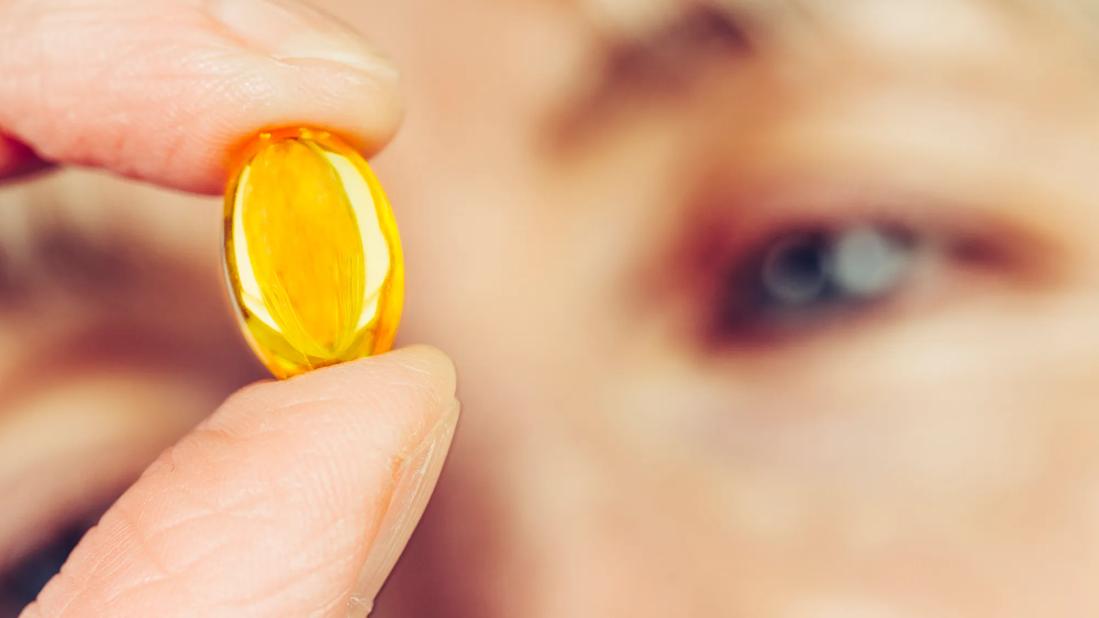In moderation, vitamins A, C, D, E, B12 and omega-3 fatty acids can improve and maintain your eye health

Image content: This image is available to view online.
View image online (https://assets.clevelandclinic.org/transform/70372e44-3dee-4a23-be7a-e95ad81ea16a/capsule-eyes-507804886)
Person holding a gel capsule, examining it
Finding any relief for evaporative dry eye is important, especially if you’ve been uncomfortable for quite some time. Luckily, there are some foods and vitamins that can help improve your recovery time and prevent dry eyes going forward.
Advertisement
Cleveland Clinic is a non-profit academic medical center. Advertising on our site helps support our mission. We do not endorse non-Cleveland Clinic products or services. Policy
Optometrist Alexandra Williamson, OD, shares which foods and supplements are most helpful and why you should check with a healthcare provider before stocking up.
Anything you eat plays a part in how your body responds to various illnesses and treatments. So, making changes to your diet and nutrition can have a big impact on your overall health.
An anti-inflammatory diet, for example, may help treat chronic inflammatory conditions. So, you may want to evaluate what vitamins, minerals and foods you’re eating when you have an underlying condition like dry eyes.
“We know healthy oils and leafy green vegetables contain specific vitamins that are healthy in general for everyone,” says Dr. Williamson. “But when it comes to vitamins and supplements, you want to focus on moderation and what’s individually recommended for you by your doctor. It’s important not to overdo it.”
Any time you increase or decrease the amount of vitamins or supplements you’re consuming, it’s important to talk to your primary care provider or family physician. This is also true if you’re seeing an optometrist for treating dry eyes or any other specialist, like a cardiologist.
“What’s healthy for your body is healthy for your eyes, too,” says Dr. Williamson. “But whenever you’re taking something by mouth, it’s not just going to your eyes. So, we have to coordinate with your regular doctor and any specialists you’re seeing so we can treat your dry eyes in the context of everything else you’ve got going on.”
Advertisement
Too much of any vitamin can be toxic, and too little can cause vitamin deficiencies. So, if you start making a bunch of changes without clearing it first with a healthcare provider, you may end up with bigger problems.
Once you get an all-clear from a healthcare provider, they may recommend the following vitamins for dry eyes, along with other substances found in different foods and supplements:
When taken in moderation, any one of these vitamins can complement traditional dry eye treatments. But unless otherwise directed by your healthcare provider, you should focus on getting most of your vitamins from whole food sources and eating a healthy, well-balanced diet. Supplements aren’t always safe for everyone, especially because they’re not regulated by the U.S. Food and Drug Administration (FDA).
If you’re unclear of your vitamin levels or you’re curious about increasing your doses, make an appointment with a healthcare provider first. You can always bring this up at your next eye exam, too.
“The best thing you can do is come in and talk to the experts,” advises Dr. Williamson. “Keep up with regular visits and be honest with us about your symptoms and any supplements you’re taking.”
Advertisement

Sign up for our Health Essentials emails for expert guidance on nutrition, fitness, sleep, skin care and more.
Learn more about our editorial process.
Advertisement
Pink eye tends to start in one eye before spreading to the other, while allergies usually affect both eyes at the same time
Early morning red eyes can be a sign of several conditions, like dry eyes, allergies and eye strain
See an eye specialist if your pain isn’t going away and comes with other symptoms
Your eyes could be burning because of allergies, elevated salt levels, dry eyes and more
One is a raised yellow spot on your eye, the other is a fleshy growth
When worn incorrectly, contacts can cause or worsen dry eye symptoms
Preservative-free lubricating drops, a humidifier, sunglasses and preventive medications can help with dry eyes, no matter the season
Pink eye usually refers to infectious conjunctivitis, which can look similar to allergies or other infections and eye conditions
Although it could be used as a moisturizer, this new trend is not recommended
Communicating clear limits helps protect your time, energy and emotional well-being
High cholesterol can be genetic, but testing and treatment can lower your heart disease risk